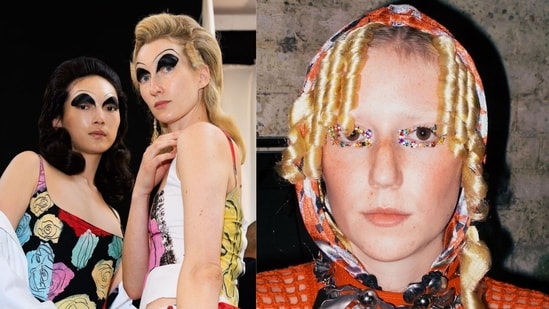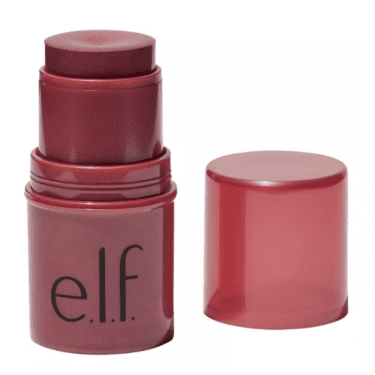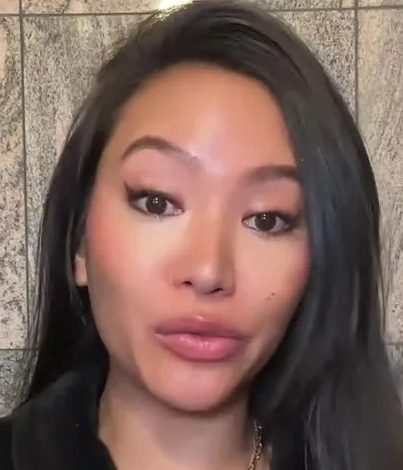
‘It makes me wonder if I’m doing something wrong.’ How tweens are navigating social media’s beauty standards
Tweens growing up with social media are inundated with rapidly changing beauty standards and the social pressure to conform to them.
In this episode of the RadioActive podcast, Jehan Hashi, Josue Villalobos ,and Vivi Cardenas-Habell look into how tweens navigate this digital space and why it matters.
[RadioActive Youth Media is KUOW’s radio journalism and audio storytelling program for young people. This podcast was entirely youth-produced, from the writing to the audio editing.]
Podcast highlights:
- Thirteen-year-old Yadira Villalobos thinks middle schoolers are still awkward and immature, even as they replicate teen and adult style trends on social media.
“I see my school resembling my TikTok feed a lot,” Yadira said. “And it honestly makes me laugh because at the end of the day, we’re still, like, little kids. And I think we just want to be as cool as people on TikTok lowkey.”
- Psychology professor Dr. Lucia Mahis-Weinberg says wanting to be popular, have friends, get attention, and be liked by others is a natural process of being an adolescent. And there are specific implications for girls.
“I think societal standards are different for girls and young women,” Mahis-Weinberg said. “We put undue pressure on young girls to be concerned with their appearance, and to tie their worth as a person with how they look. And that’s very toxic.”
- Feminist studies researcher Dr. Michelle Morado says social media contributes to a “skewed expectation” of what people look like and what their lives are like, which can be particularly damaging to tweens.
“To be exposed to expectations and ideals that are unattainable [as a tween] can contribute to a lot of harm. It can really be damaging to self-esteem,” Morado said. “And that’s when we start to see, in addition to other factors, the rise of, like, eating disorders and self-harming behavior — expressing this feeling of not measuring up to expectations.”
- But Dr. Mahis-Weinberg says social media today isn’t all bad.
“Social media has given a voice to a lot of people,” Mahis-Weinberg said. “We’re seeing much more diversity. We’re seeing user-generated content that’s telling us about experiences that weren’t necessarily represented before. I think it has helped in diversifying the people we see as beautiful.”
- RadioActive’s Vivi Cardenas-Habell encourages young people to think critically about what’s on their social media feeds.
“I for one would like to curate my social media so that I see a more realistic reflection of people’s lives,” Cardenas-Habell said.
- And RadioActive’s Josue Villalobos says expressing yourself and your beauty shouldn’t be difficult.
“We’re all beautiful in our own ways,” Villalobos said. “What matters is refusing to let social media dictate it.”
Podcast transcript:
[Overlapping voices of the podcast hosts parodying TikTok beauty influencers. The “beauty tips” get more absurd as their voices get louder and more distorted.]
Josue: Being beautiful is hard.
Jehan: Yeah, with all these new social media trends and beauty standards it’s really hard to keep up.
Vivi: It leaves no room to feel truly beautiful.
Jehan: In order to keep up with beauty trends, tweens are forced to grow up too fast.
Vivi: Yeah, I don’t see the awkward phase I had growing up in my tweens.
Josue: Well, times have gone by since we were last tweens. Technology has advanced, fashion has changed, music is different, and… social media has taken over.
Jehan: Yeah, I am on my phone 24/7.
Vivi: It’s so easy to continuously scroll and lose track of time.
Josue: Literally! I’m always scrolling past trends. It seems like they’ve taken over apps like Instagram and TikTok. I have seen some… interesting things arise.
Vivi: Yeah, some trends are definitely uncalled for. There are also so many clickbait-y beauty tips, like having tiny fish eat the dead skin off your toes.
Josue: Or eating tapeworms to lose weight!
Jehan: Don’t forget lemon cinnamon coffee sugar face scrubs!
Vivi: Ouch! Why would someone want to put that on their face?
Josue: Well, in this society attaining “beauty” equals validation and status. But, it’s not as simple as a couple of tweens having insecurities about their looks. It’s grown into something much bigger.
Josue: Welcome to another episode of the RadioActive podcast. My name is Josue.
Jehan: My name is Jehan.
Vivi: And I’m Vivi.
Jehan: RadioActive is a program where youth come together and produce great radio at KUOW Public Radio in Seattle.
Josue: We’re digging deeper into the minds of tweens and how the fast-paced trend cycle of social media distorts their perception of beauty.
Vivi: As teens we have seen how these constantly changing beauty standards feel like they’re never attainable.
Jehan: We’ll cover some of our personal experiences, advice from professionals, tween perspectives, and the psychology that is impacted during this stage that tweens are in.
What tweens have to say
Josue: When I was around the age of 13, I wasn’t as hyper-focused on my appearance as I see 13-year-olds now.
Jehan: Yeah, I remember not being on TikTok so I couldn’t be focused on remedies for skin issues or fashion tips that we constantly see today.
Vivi: Totally, you know, l wonder what a tween would say about this.
Josue: I’m so glad you asked!
Jehan: We interviewed Yadira Villalobos, a 13-year-old social media trend warrior. Yadira is in middle school and is Josue’s cooler younger sister.
Yadira: I think middle schoolers are still awkward and immature, but I think we just look a little bit older. I see my school resembling my TikTok feed a lot. And it honestly makes me laugh because at the end of the day, we’re still, like, little kids. And I think we just want to be as cool as people on TikTok lowkey.
Jehan: Alongside awkwardness, Yadira expresses another factor, common both in the tween experience and online.
Yadira: I just know a lot of people that compare themselves to other people and are very insecure about some stuff because of the beauty standards.
Vivi: It’s really interesting that social media exacerbates comparison.
Josue: Yeah, comparison is a huge part of the whole self-consciousness and stress that comes with social beauty standards.
Jehan: Constantly seeing people with perfect skin, hair, teeth, bodies, and lives, it honestly takes a toll on my mental health. It makes me wonder if I’m doing something wrong.
Josue: Sometimes when I’m scrolling, I just feel so much pressure to look like the people on my screen.
Vivi: Yeah, I feel that. I wonder how this can impact our psychology.
What psychologists have to say
Josue: We spoke with Dr. Lucia Magis-Weinberg, a psychology professor at the University of Washington, about why tweens are so significantly impacted by social media trends and beauty standards.
She brought up how tweens are in a unique state in their lives, with more pressure from peers, school, and parents.
Magis-Weinberg: Young people want to be popular, they want to have friends, they want to get attention, they want to be liked by others. That’s a very natural process of being an adolescent.
Jehan: I feel like this is a universal experience for all young people, regardless of their social media use.
Josue: But social media also makes it harder to distinguish between what’s real or fake. It often makes every young girl want to be the coolest or trendiest. Especially with constant posts telling you how to be beautiful or how you should look. It’s totally understandable why tweens, especially young girls, seem so trendy now. It’s because social pressure is making them conform to what is popular.
Vivi: The yearning for beauty in women is a deep-rooted societal issue. Dr. Magis-Weinberg tells us more about this.
Magis-Weinsberg: I think it’s society and societal standards that are different for girls and young women. We put undue pressure on young girls to be concerned with their appearance, to tie their worth, as a person, with how they look. And that is not something that is inherent to girls, right? That is what society has asked girls and women for a long time. It holds different standards, right? For girls and women. And that’s very toxic.
Jehan: I absolutely agree that this issue goes beyond social media. Women have been told to look and act a certain way before social media was even created.
Josue: Now we can see that beauty standards are making people insecure at a significantly faster rate. It’s as simple as opening your Instagram.
Vivi: And when you scroll through your feed, the algorithm is so tailored and specific to us users. All it takes is for you to search up a beauty product and you’ll see constant ads for similar products.
Magis-Weinberg: So, if once I’ve searched for acne cream, they know that likely I have acne. The algorithm will keep feeding this content, you’ll end up buying these creams, so then the social media companies make a profit out of you buying the product.
Josue: Honestly, it’s kinda scary because most social media feeds are wired to selling you products.
Vivi: This is really not ideal for tweens with developing brains. Dr. Michelle Morado, a recent graduate from the University of Washington with a Ph.D. in feminist studies, has more on this.
Morado: Bodies change a lot, as tweens. Thinking changes a lot as teens. It’s a pretty transformative period in a young person’s life. And to be exposed to expectations and ideals that are unattainable can really contribute to a lot of harm. It can really be damaging to self-esteem. And that’s really when we start to see, in addition to other factors, the rise of, like, eating disorders and self-harming behavior — expressing this feeling of not measuring up to expectations.
Jehan: On top of that, social media can make you doubt yourself or convince yourself into thinking you need some product to be beautiful.
Jehan: Not only do products become popular on social media, but seemingly harmless videos end up going viral and later result in young people feeling insecure. Let’s hear some insecurities that Yadira has seen in her life.
Yadira: Some insecurities that I hear people have that are very common is, like, about noses. I’ve had a lot of people close to me be insecure about their nose. I was at my friend’s house, and they were making comments about their nose to me. And they were making fun of their nose size, and saying how insecure they were, and calling themself names. And I feel like on social media, you do see a lot of people with smaller noses.
Jehan: That’s great that she brought up people having nose insecurities. I remember noticing how certain TikTok trends will focus on showing your side profile and all the girls with small button noses would be at the top when you click on the sound.
Josue: Omg yessssssss. I noticed that too! Honestly, there are so many TikTok trends that focus on beauty, and typically the most conventionally attractive people will be at the top of that sound.
Vivi: I can guarantee you that a lot of these trends centered around improving your appearance are making people insecure about things that they didn’t even think to be insecure about.
Jehan: I feel like this leads to more internalized pressure for tweens to perform and abide by the beauty standard.
We also spoke more about this with Dr. Morado. She shed some light on social media perpetuating insecurities upon tweens.
Morado: Advertisers will also really work to convince you like, “Hey, if you didn’t think you had this problem, let me introduce you to one so we can sell you a product to remedy it.” It’s kind of creating this sense of insecurity, and then selling us something to fix it, to solve it, to make ourselves feel more confident or more secure.
Jehan: I relate heavily to this. I remember in 2021, I became very self-conscious about my hyperpigmentation because I kept seeing so many TikToks about how to improve or get rid of it. Now I’m at the point where I realize it’s completely normal and very very common.
Josue: Yea, I struggled with acne throughout the past two years, and the only thing I could think about was how to get rid of it to feel beautiful again. However, now I just try to be my true and natural confident self.
Vivi: I didn’t realize that hip dips were a thing or that people saw them in a negative light until I joined social media.
Jehan: Social media really alters your perception of what people really look like. Here’s Dr. Morado again with more details.
Morado: These are often highlight reels where people are presenting, you know, they’re looking their best, representing the highlight moments of their lives. And so, it can create kind of this skewed expectation, not just in terms of like, what one’s life experience is like, but also how one looks.
Vivi: Hearing from these experts, it’s clear that tweens are more likely to get swept up in tying their worth to attaining beauty standards because they are at a stage in their life where they are shaping their identities.
Josue: Oh no! How can we come back from this? Is social media leading us to our inevitable doom?!?
So what can we do?
Vivi: Well, let’s see! Earlier we touched on the negative impact of social media on tweens, how it can affect beauty standards, their self-worth, and more.
Josue: That is a lot. But how do we take the first step to unlearning all of this?
Jehan: Well, one thing to acknowledge is social media isn’t entirely a bad thing. There are still lots of positive aspects to it.
Vivi: Social media can allow us to learn more about the world, whether it be activism, art, or really anything we have an interest in.
Jehan: We’re also able to see so much diversity online and learn about social movements.
Vivi: Totally! I have seen a lot of self-love campaigns and body neutrality videos going viral.
I for one would like to curate my social media so that I see a more realistic reflection of people’s lives. I think that could help with my self-worth. Dr. Magis-Weinberg also shares this idea.
Magis-Weinberg: Social media has given a voice to a lot of people. So, we’re seeing much more diversity, we’re seeing user-generated content that’s telling us about experiences that weren’t necessarily represented before.
I think it has helped in diversifying the people we see as beautiful. The bodies that we see, the diversity of skin colors, and hair and eyes that we see, that didn’t used to be the case.
Jehan: Yeah, I relate to that 100%. There is a lot of room for teens to embrace their true selves online. Yadira shares this positive outlook as well.
Yadira: I feel like anyone can do anything they want if it makes them feel beautiful or happy. I feel like everyone has one way to express themself.
Josue: I feel like supporting each other and having a positive outlook for other people’s struggles with social media can really create the change that we want to see.
Vivi: That’s so real. Making sure you’re aware of the strange rabbit holes online and critically thinking about what’s on your feed is also really important.
Jehan: I still love apps like TikTok and Instagram. However, from now on I will take the overwhelming beauty tips on those apps with a grain of salt.
Josue: Expressing your beauty shouldn’t be a difficult feat. We’re all beautiful in our own ways. What matters is refusing to let social media dictate it.
This podcast was produced in a RadioActive Youth Media introductory workshop for high school-age youth. Production assistance by Alayna Ly. Edited by Kelsey Kupferer. Prepared for the web by Kelsey Kupferer.
Find RadioActive on Instagram, TikTok, YouTube and Facebook, and on the RadioActive podcast.
Support for KUOW’s RadioActive comes from the Bill & Melinda Gates Foundation Discovery Center and BECU.


